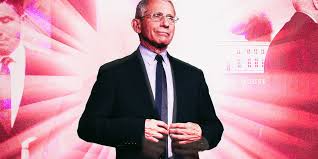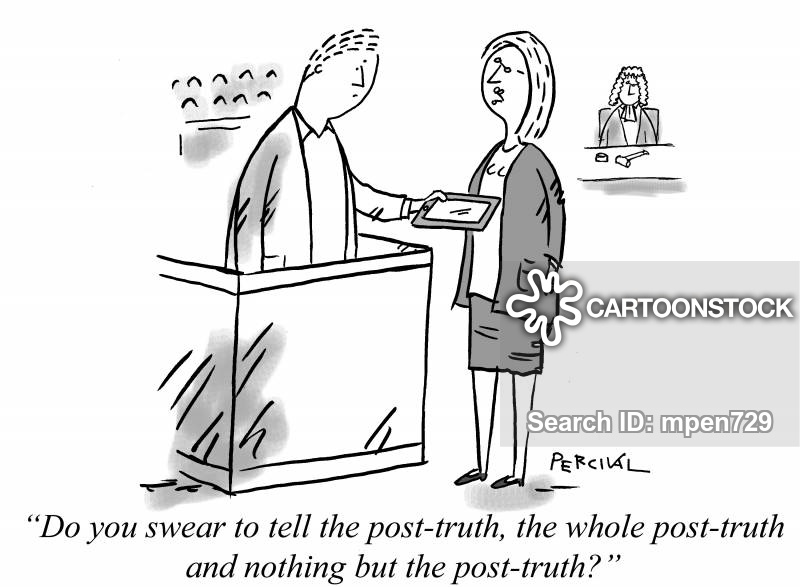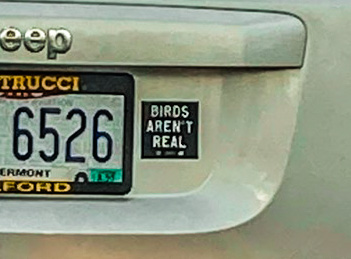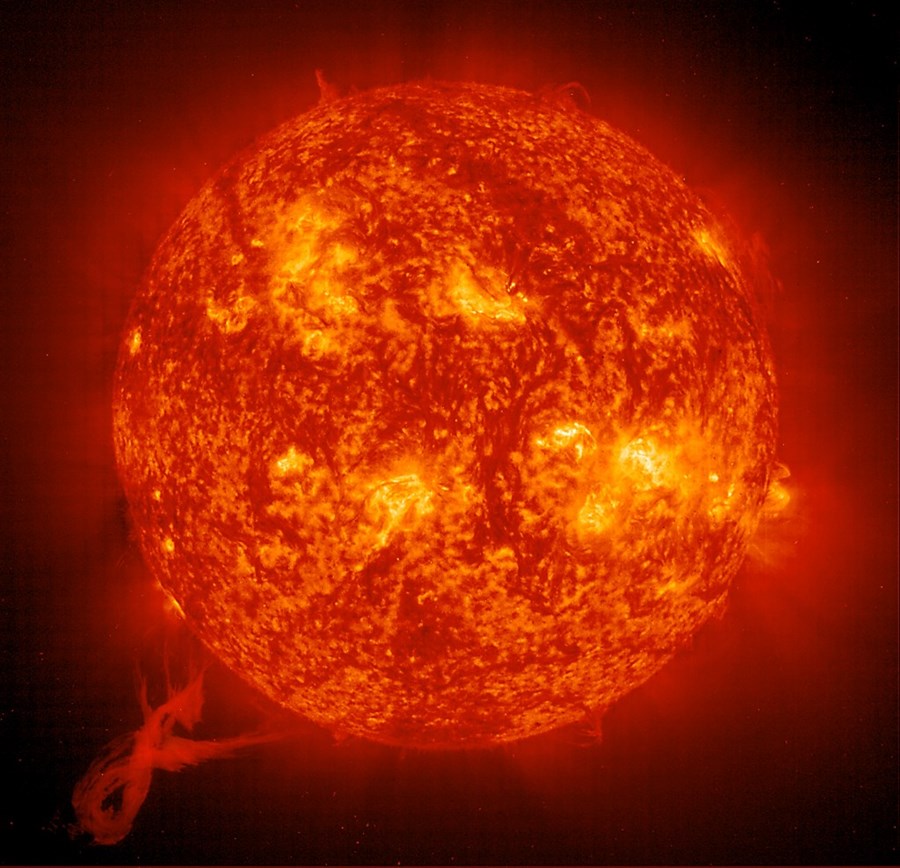“Getting back to what you said just a moment ago that ‘X percent’—I think you said 37 percent—of doctors feel that it’s beneficial. We don’t operate on how you feel. We operate on what evidence is, and data is.”
Dr. Anthony Fauci, Fox News, April 3, 2020 (listen)
And, a giddy Fauci (watch)
What does it mean to speak of a post-Truth era? Is the concept of post-truth a useful category? Even if this concept doesn’t quite work, what has happened in modern democracies–and in the US, in particular–that has made Truthtelling a problematic and controversial endeavor? Or, to draw upon Fauci’s point, why should “feeling” trump Truth? Or, why should people automatically assign truth claims to their feelings? The impact of this crisis over the meaning of Truth are everywhere, from our catastrophically poor response to the Coronavirus pandemic to the denial of basic facts about issues, such as global climate change, racial inequality, and even elementary scientific principles.
In this section of our seminar, we will consider contending explanations of our contemporary crisis of Truth. It is not surprising that Truth has many pretenders who claim to be its parents. In some cases, one may have the rare opportunity to “choose one’s family.” But in most cases, we are stuck with the people–or facts–that gave us life.
12. Thursday, February 17: What is post-Truth? Are we in age of post-Truth? If so, what does a post-Truth age entail for people’s behavior?

Lee McIntyre begins the discussion of post-Truth with the following types of questions: Is post-Truth wishful thinking, political spin, mass delusion, bold-faced lying? Is it now possible to believe absolutely anything?
Lee MacIntyre, Post-Truth Read: Chapters 1 and 2
Jonathan Haidt, “Why it feels like everything is going haywire,” The Atlantic, November 12, 2019: PRINT AND READ
Andrew Marantz, “Trolls for Trump,” New Yorker, October 24, 2016. READ
Consider this statement by the philosopher René Girard:
“We live in a world today, especially in the humanities, where the very notion of truth has become the enemy. The idea is you must have plurality. So, today, the interest of plurality takes precedence over the search for truth. You have to say ahead of time that you don’t believe in the truth. In most of the circles in which I move, decency is equated with a skepticism verging on nihilism”
If you missed it, Your First Essay Assignment is HERE
13. Tuesday, February 22: Who’s at Fault? It’s Politicians, Damn Politicians!
Discussion Theme: The wave of populist politics that has swept across the liberal democratic world in recent years has many causes. One of the most prominent is the collision between elite domination and the demand for popular participation. Elites and ordinary citizens distrust and dislike each other with equal fervor. One of the primary manifestations of this conflict is the battle over Truth—what it is, who determines it, and whether it even matters.
Sophia Rosenfeld, Democracy and Truth A Short History, Chapter III
Paul Gosar, “Letter to Arizona,” December 7. 2020, revolver.news READ
Andrew Higgens, “The Art of the Lie,” New York Times, January 10, 2010 PRINT AND READ
Davey Alba, “Q has been quite, but QAnon lives on” PRINT AND READ
Also, for related ideas, look back at Lee MacIntyre, Post-Truth Read: Chapters 1 and 2
14. Thursday, February 24: Who’s at fault? It’s human beings, stupid!
Let’s avoid the sin of presentism. As easy as it might seem to explain everything in terms of our current political climate, human beings have always had a tenuous relationship with the Truth. Regardless of the time or place, why do some people persist in their denial of simple facts or refuse to recognize clear contradictions in their own experiences. One possibility is that we are wired this way. Today, we will consider scientific theories about the psychological roots of denial.
There are a lot of articles here, but most are short.
Lee McIntyre, Post-Truth READ: Chapter 3
Albert Camus, “The Plague” (only two paragraphs, but read them closely since there’s a lot there) READ AND PRINT
Sara Garofalo, “The Psychology Behind Irrational Decisions” PRINT AND READ
John Jerrim, et al., “Bullshitters: Who are they and what do we know about their lives?” Institute of Labor Economics, TAKE NOTES and CONCENTRATE on the authors’ major findings.
Daniel Dale, “We Like the President’s Lies,” The Star, March 26, 2017 PRINT AND READ
Thomas Edsall, “Why millions of Americans think it is Trump who cannot lie” PRINT AND READ
Think about this: How can you trust someone if you know they are lying to you? This behavior is provocatively counterintuitive. Still, it seems quite common. Is this because trust isn’t necessarily based upon factual claims. If so, what is it based on?
Rebecca Solnit, “Why Republicans Keep Falling for Trump’s Lies” PRINT AND READ I was initially not inclined to use this article because of the partisan title. However, when I read it, I couldn’t find much I disagreed with. Let me know what you think.

“Birds aren’t real, or are they? READ I’m afraid some of these “birds” are patrolling the Notre Dame campus
Another nefarious plot? HERE (Begin listening at 32:39)
15. Tuesday, March 1:
Who’s at fault? It’s the Corporate Merchants of Doubt!
Today, Truth-denial takes many forms, including the dismissal of the dangers of both global climate change and the Coronavirus. When I was growing up, Truth-denial took the form of denying the causal relationship between smoking and cancer. The tobacco industry played the central role in propagating the myth that the “verdict was still out” on the connection—even though, its own scientists knew that the verdict was already in. Untold numbers of people died as result of a cause of cancer that we now recognize as self-evident.
Naomi Oreskes, Erik M. Conway, and Erik M. Conway, Merchants of Doubt : How a Handful of Scientists Obscured the Truth on Issues from Tobacco Smoke to Global Warming, pp. 1-34, 136-148 PRINT AND READ
Note: Because the Library has only “one” online copy of this book, each of you will need to visit this site at different times so that you can each download and print the material. Don’t wait until the last minute to do so, lest you run into someone who has done the same thing.
16. Thursday, March 3:
Discussion of the war in Ukraine
17. Tuesday, March 15
Who’s at fault? It’s Americans and their perplexing problem with scientists and science.
Another source of our problem may be quintessentially American. For reasons related to the social, cultural, and religious conditions of our nation’s founding, we, as Americans, may be culturally wired to resist scientific and intellectual authority.
Richard Hofstadter, Anti-Intellectualism in American Life
Two chapters (3 and 6) available on Course Reserves in Hesburgh Library PRINT AND READ
Does the earth really revolve around the sun? Evidently, it depends on whom you ask: READ
